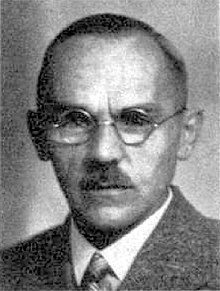Karl Ahorner
Karl Ahorner (born September 8, 1889 in Kirchdorf , Styria , † August 6, 1949 in Leoben ) was an Austrian politician ( NSDAP ).
Live and act
After attending elementary school and a humanistic grammar school , Karl Ahorner was trained at the teacher training institute in Graz . Since 1908 he worked as a teacher. From 1915 to 1918 he took part in the First World War with the Austro-Hungarian Army , in which he fought on the Italian front. He returned from the war as 40% disabled.
Ahorner joined the NSDAP in 1923. In 1925 he also became SA leader. In the same year he took over the office of deputy local group leader. After he had been a leader of the Styrian Homeland Security from 1927 to the autumn of 1930 , Ahorner acted as local and district manager of the NSDAP from 1930 to 1938. From 1932 to 1933 he was also the head of the National Socialist community in Bruck an der Mur. In June 1933 he was arrested for high treason by order of the Leoben District Court , but had to be released for lack of evidence. From 1934 to 1939 he was NSDAP district leader in Bruck an der Mur .
After the German invasion of Austria until April 1939, Ahorner served as district leader in Bruck. From April 1938 until the end of the Nazi regime in the spring of 1945, Ahorner was a member of the National Socialist Reichstag for Austria . Ahorner, who had been a Gauredner since 1930, was appointed Gauredner in the office of the Reich Propaganda Headquarters in December 1941 . In the SS he reached the rank of Untersturmführer.
On March 16, 1948, Ahorner was sentenced by the Graz People's Court to ten years of imprisonment. The punishment was based primarily on Ahorner's role as district returning officer in the referendum on the " annexation " of Austria to the German Reich , which was scheduled after the German invasion of Austria :
“The defendant was first, as he himself admits, the district returning officer. This, too, falls under the offense of Article 1, Paragraph 6 of the KVG, since the preparations for a so-called election against foreign countries were supposed to be a propaganda with figures that allegedly stood behind Hitler, and this was the first stage in the establishment of the NS- There was tyranny in Austria. "
Ahorner died a year later, on August 6, 1949, shortly before his 60th birthday. A few days before his death, while he was being treated in the Stefanie Hospital in Leoben , he was taken back into the Roman Catholic Church, which had left in 1939.
literature
- Erich Stockhorst : 5000 people. Who was what in the 3rd Reich . 2nd Edition. Arndt, Kiel 2000, ISBN 3-88741-116-1 .
Web links
- Karl Ahorner in the database of members of the Reichstag
Individual evidence
- ↑ a b Entry in the birth register of the Roman Catholic parish in Pernegg No. 46/1889 ( online ).
- ^ Institute for Contemporary Legal History: Yearbook of Contemporary Legal History , Vol. 8, 2006/2007, p. 42.
| personal data | |
|---|---|
| SURNAME | Ahorner, Karl |
| BRIEF DESCRIPTION | Austrian politician (NSDAP) |
| DATE OF BIRTH | September 8, 1889 |
| PLACE OF BIRTH | Kirchdorf , Styria |
| DATE OF DEATH | August 6, 1949 |
| Place of death | Leoben |
